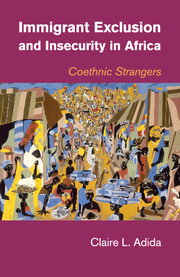Book contents
- Frontmatter
- Dedication
- Contents
- List of Figures
- List of Tables
- Acknowledgments
- 1 Introduction
- 2 Immigrants and Their Leaders
- 3 Immigrant Exclusion from Host Societies
- 4 Alternative Explanations
- 5 Mass Immigrant Expulsions in Africa
- 6 Conclusion
- Appendix A Constructing the Immigrant Attachment Index
- Appendix B Constructing the Cultural Overlap Index
- Appendix C List of Mass Expulsions and Variable Description
- Bibliography
- Index
2 - Immigrants and Their Leaders
Published online by Cambridge University Press: 05 July 2014
- Frontmatter
- Dedication
- Contents
- List of Figures
- List of Tables
- Acknowledgments
- 1 Introduction
- 2 Immigrants and Their Leaders
- 3 Immigrant Exclusion from Host Societies
- 4 Alternative Explanations
- 5 Mass Immigrant Expulsions in Africa
- 6 Conclusion
- Appendix A Constructing the Immigrant Attachment Index
- Appendix B Constructing the Cultural Overlap Index
- Appendix C List of Mass Expulsions and Variable Description
- Bibliography
- Index
Summary
Karim is a Nigerian Hausa who traveled from his hometown in Kano (Nigeria) to Accra (Ghana) eight years ago to seek, among other things, a better livelihood. He arrived without a job or resources and had to rely on the kindness of a fellow Nigerian Hausa he met arriving in Accra, who housed and supported him financially for a week. He found his first job through a walkin interview at a health service company that had advertised the opening on a billboard. He found his second job through a connection hemade with his first employer.His wife and children live with him in a suburb of Accra. He is fluent in his native Hausa, in English, and in Twi, the most widely spoken Ghanaian language. He is currently learning Ga, the indigenous language of Accra. On weekends, he joins other Hausas to study the Koran. When he first arrived in Ghana, he did not seek the help or assistance of the Hausa community organization: he did not even know it existed. He eventually found out that it did through a friend but, he claims, “compared to the Yorubas and the Igbos, they don't do as much.”
Michael is a Nigerian Yoruba who traveled from his hometown in Ogbomosho (Nigeria) to Accra (Ghana) in 1989. He arrived as a trader transporting and selling goods between Nigeria and Ghana. His sister and uncle, who were already settled and working in Accra, loaned him money and offered him a place to stay to assist him upon arrival. Because of financial difficulties and a stroke of bad luck, he is currently unemployed. He spends his time at the Mark Hayford Memorial Baptist Church in downtown Accra, a large and lively church whose membership is largely Yoruba. He finds support from family and friends in the church. His wife, a Yoruba who was born in Ghana and whom he met through the church in Accra, is back in Nigeria with their three children. He speaks Yoruba and English fluently. He speaks only a little bit of Twi. He is an active member of the Yoruba Community and of his hometown association, the Ogbomosho Parapo, where Yorubas “help each other out, especially if people get in trouble”.
- Type
- Chapter
- Information
- Immigrant Exclusion and Insecurity in AfricaCoethnic Strangers, pp. 39 - 68Publisher: Cambridge University PressPrint publication year: 2014

